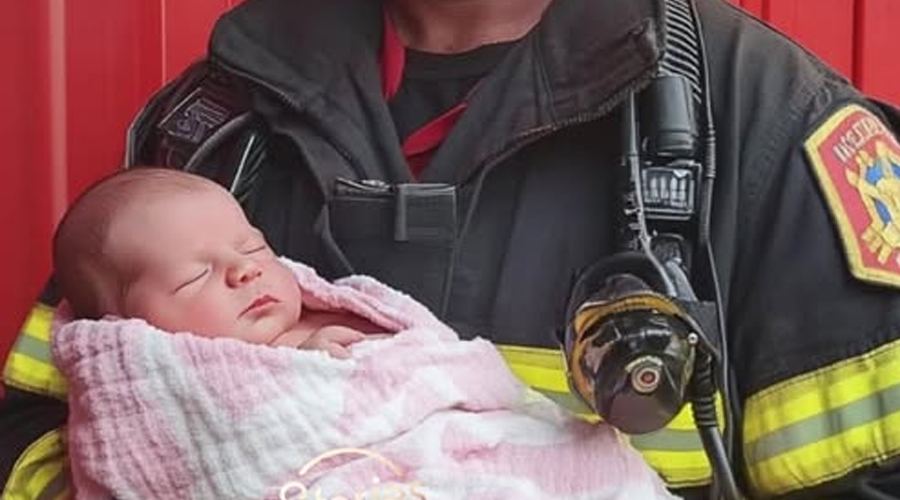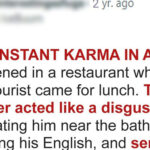I still remember the night I found him—a tiny bundle wrapped in a worn-out blanket, left in a basket near my fire station. It was my shift, and the cold wind howled as if mourning the little soul abandoned to fate.
He was barely a week old, his cries weak but full of determination. My partner, Joe, and I exchanged glances, unspoken words passing between us.
“We’ll call social services,” Joe said, his voice steady. But I couldn’t shake the feeling that this baby was meant for something more… or maybe just meant for me.
Months passed, and when no one came forward to claim him, I filed for adoption. I named him Leo because he roared through every challenge, just like a little lion.
Being a single dad wasn’t easy, but Leo made every sleepless night and every spilled spaghetti sauce stain on the carpet worth it. He was my son in every way that mattered.
Five years went by, and our life had settled into a perfect rhythm. Leo was thriving—a chatterbox who loved dinosaurs and believed he could outrun the wind.
That night, we were building a cardboard Jurassic Park when a knock on the door shattered our peace.
Standing before me was a woman in her early thirties, her face pale, her eyes carrying the weight of the world.
“YOU HAVE TO GIVE MY CHILD BACK,” she said, her voice trembling but firm.
For a moment, all I could do was stare. My heart hammered in my chest, and a thousand questions buzzed through my mind. Leo, standing behind me clutching a cardboard triceratops, peered curiously around my leg.
“Your child?” I finally managed to say, my voice coming out quieter than I intended.
Her lips parted as if she wanted to say more, but the words tangled up in her throat. She took a breath, then repeated, “I’m the mother of the baby you adopted. The one you found at the fire station.”
Her statement hung in the air like an echo that wouldn’t fade. I swallowed hard, noticing the slight tremble in her hands. Suddenly, I felt a surge of both protectiveness and confusion. I had spent five years bonding with Leo, raising him, and loving him. This woman’s sudden appearance threatened to unravel everything.
She glanced down, as if gathering her courage. “My name is Celeste. I…had no choice back then. But I want him back now.”
Inside, anger wrestled with empathy. Legally speaking, Leo was mine; the adoption was final. But I also knew that biology carries a deep weight for some people. I could see something in Celeste’s eyes—some mixture of desperation and regret—that made me pause.
I ushered her inside, if only because I didn’t want Leo to hear this conversation in the hallway. “Let me put him to bed,” I said. Leo was still peering up at her curiously. “Buddy, I need you to wash up, brush your teeth, and hop into bed, okay?”
Leo nodded, though he kept glancing at Celeste. He sensed something was off but trusted me enough to let it go for the moment. After walking him down the hallway, tucking him in, and promising I’d be there soon to read him a story, I returned to the living room.
Celeste stood awkwardly by the couch, gazing at the pictures on the wall. Pictures of me and Leo: at the beach, at birthday parties, in the backyard painting silly watercolors together. Her eyes lingered on each photo as if capturing glimpses of what she’d missed.
“You gave him a good life,” she said, turning to me, voice catching. “It shows.”
I swallowed, feeling both pride and fear coil in my chest. “He’s an amazing kid,” I said softly. “But you need to explain to me why—why you left him. Why you’re here now.”
Celeste nodded, shoulders slumping a little, as if a heavy weight pressed down on her. “I was in a really bad place,” she began, and her eyes drifted to a spot on the floor, like she couldn’t stand to meet my gaze. “I was young, with no support. The father left as soon as he heard about the pregnancy. My parents…we were never close. I had nowhere to go, no savings, no plan. I remember hearing that a fire station was a safe place. I thought…maybe…he’d get a better chance.”
Tears welled up in her eyes, but she blinked them back. “It was the hardest thing I’ve ever done, leaving him. But at the time, I couldn’t see any other way.”
My anger began to melt as I heard her story. “Why show up now?” I asked quietly.
She took a shaky breath. “Over the last five years, I’ve been trying to rebuild my life. I have a job, I’m saving money. I got therapy to help me work through my issues. And then, every day, I’d think of him and wonder…did I do the right thing? Or did I break the biggest rule of being a mother by letting him go?” She closed her eyes for a moment, fighting back another surge of emotion. “When I found out you officially adopted him, part of me thought, ‘Okay, he’s safe. He’s loved.’ But another part of me ached every day.”
I ran a hand over my face. “Celeste, I understand your pain. But I’m his dad. Legally, emotionally…he’s my son. He calls me Dad.” I could feel tears threatening to form, but I held them back. “I can’t just give him back to you.”
She nodded, clearly anticipating that response. “I know it’s complicated. I didn’t mean to barge in and scare you both. I just… I thought maybe I could have a chance to be in his life again. To fix what I did.”
Her words hung in the air, and I realized this was about more than just legality—it was about the best interest of the child I adored.
For days afterward, I couldn’t sleep. I kept replaying Celeste’s face, her haunted eyes, the sincerity in her voice. I also kept looking at Leo—his bright smile, his unconditional trust in me. I felt torn. On one hand, I had every right to protect him from uncertainty, from confusion. On the other hand, maybe he deserved to know the woman who brought him into this world, if she was safe and genuine.
I reached out to Joe, my longtime partner at the fire station. “What do you think?” I asked him over a cup of coffee in the station’s lounge.
Joe took a moment to answer. “Look, you’re his dad,” he said gently. “Nothing changes that, not biology, not a piece of paper. But sometimes, there’s room in a kid’s life for more love. If she’s the real deal—and it sounds like she might be—maybe you can find a way that works for everyone.”
His words eased some of the pressure in my chest.
Eventually, Celeste and I agreed to meet up at a nearby park—neutral territory—so she could see Leo in a friendly, casual setting. It was early evening when we arrived. The sun was low, painting the sky in warm golds and pinks.
Leo raced to the playground the moment we got there, excited to explore the slides. Celeste stood off to the side, hands clasped, watching him. She was nervous, I could tell. This time, I introduced her as a friend who wanted to meet him. Leo greeted her politely, then zoomed off to chase after some kids playing tag.
We sat on a bench, exchanging small talk. Celeste tried to keep her composure, but I saw tears welling up every time she heard Leo giggling or calling out with joy.
“You did right by him,” she said, her voice choked. “You gave him the life I always dreamed he’d have.”
I took a moment to absorb her words. “He’s a happy boy,” I replied. “But I want you to understand something: I have to do what’s best for him. I can’t have him hurt or confused if you come into his life for a few months and then disappear.”
Celeste’s eyes met mine, earnest and unwavering. “I won’t just vanish. This is important to me. I want him to know he’s loved by more than just one person. If that means I start as a friend or an ‘aunt,’ I’m willing to do it carefully, step by step.”
That evening ended with Celeste politely saying goodbye to Leo, gently ruffling his hair and whispering, “I hope I see you again soon.” Leo just grinned and said, “Yeah, me too!”—oblivious to the deeper undercurrent swirling between the three of us.
Over the next few months, Celeste and I worked out an arrangement. She’d visit occasionally, we’d have picnics or playdates at the park, and she’d slowly build a connection with Leo. We decided not to reveal the full story just yet. We were waiting for a time when he could better understand.
At first, I was terrified. I felt jealous, defensive, and protective. But I couldn’t deny that Leo lit up even more whenever he saw her now. He was used to me, but with her, it was as if some invisible bond tugged gently on his heart.
Then one late afternoon, Leo and I were drawing pictures at the kitchen table—he was creating a parade of dinosaurs in crayon—when he asked, “Dad, is Celeste my mom?”
I froze, the question slicing right through me. For a moment, I couldn’t speak. Then I gently placed my hand over his. “Why do you ask that, buddy?”
He shrugged, innocent eyes gazing at me. “Sometimes I see how she looks at me…like she really, really cares.”
My heart lurched. This was the moment I’d dreaded and prepared for all at once. “Celeste is someone who loves you very much,” I began slowly, “and we’ve decided together that she’s going to be part of your life because she thinks you’re really special. We both do.”
Leo nodded, thoughtful. “Okay. That’s cool. More dinosaur hunts, right?” he asked with a grin.
I laughed, amazed at his resilience. “Yeah, buddy. More dinosaur hunts.”
It took nearly a year, but eventually, Celeste and I had a deeper conversation with Leo. We explained how families can come together in different ways. We told him that sometimes people make decisions to keep a baby safe, even if it’s not easy. We kept the explanation simple, but truthful.
Leo absorbed it with a quiet maturity I didn’t expect from a six-year-old. When Celeste finished speaking, tears glistening in her eyes, he did the most surprising thing—he climbed onto her lap and gave her a hug.
That moment was the first time I really believed we could do this. That maybe, just maybe, love was big enough to handle all of our complicated pieces.
It wasn’t always smooth sailing. Sometimes, Celeste struggled with guilt, and sometimes, I felt a sting of insecurity, afraid Leo might prefer her or resent me for not telling him earlier. But over time, we learned to put Leo first. We realized that children can have room in their hearts for more than one parent figure, as long as everyone communicates and cares.
Leo grew into a bright, thoughtful child who accepted that life doesn’t always go in a straight line. He saw that people make mistakes, but they can also grow, heal, and come together. By the time he was seven, he introduced Celeste to his friends as “someone special in my family,” which melted both our hearts.
Today, Leo is eight. He loves reading adventure books, riding his bike, and challenging me to footraces (he still thinks he can outrun the wind, and maybe one day he will). Celeste is part of our little family in a way that makes sense to all of us. She’s involved without overshadowing my role as the parent who raised him. I’m still “Dad,” and I’ll always be, but I’m grateful that Leo has another person who cares about him deeply and is there to celebrate his triumphs and comfort him through disappointments.
I learned that family isn’t always defined by blood or by adoption papers—it’s defined by the love and effort you put into each other’s lives. Celeste taught me that good people sometimes make heartbreaking choices, but they can grow past their darkest moments and choose to show up. Leo taught me that kids have an incredible capacity for love and acceptance.
If there’s a lesson here, it’s this: love can stretch farther than we imagine. And sometimes, even when you think your family is set in stone, life has a way of adding new, unexpected chapters.
I’m grateful Celeste knocked on my door that night. It forced me to open my heart to a new kind of family—one that may not look traditional from the outside, but is filled with honesty, growth, and understanding. Leo has the best of both worlds: a dad who has been there from day one (or, well, week one), and a mom who found her way back to him.
And if you take anything from our story, let it be this: forgiveness and love are powerful forces. People can change. Wounds can heal. And a child’s heart has endless room when the adults around them are brave enough to work together.
Thank you for reading our journey—one filled with uncertainty, hope, and ultimately, joy. If this story touched you or made you think about the meaning of family and second chances, please share it with someone who might need to hear it. And don’t forget to like this post to help spread the message that love truly can bring people together in the most unexpected ways.


